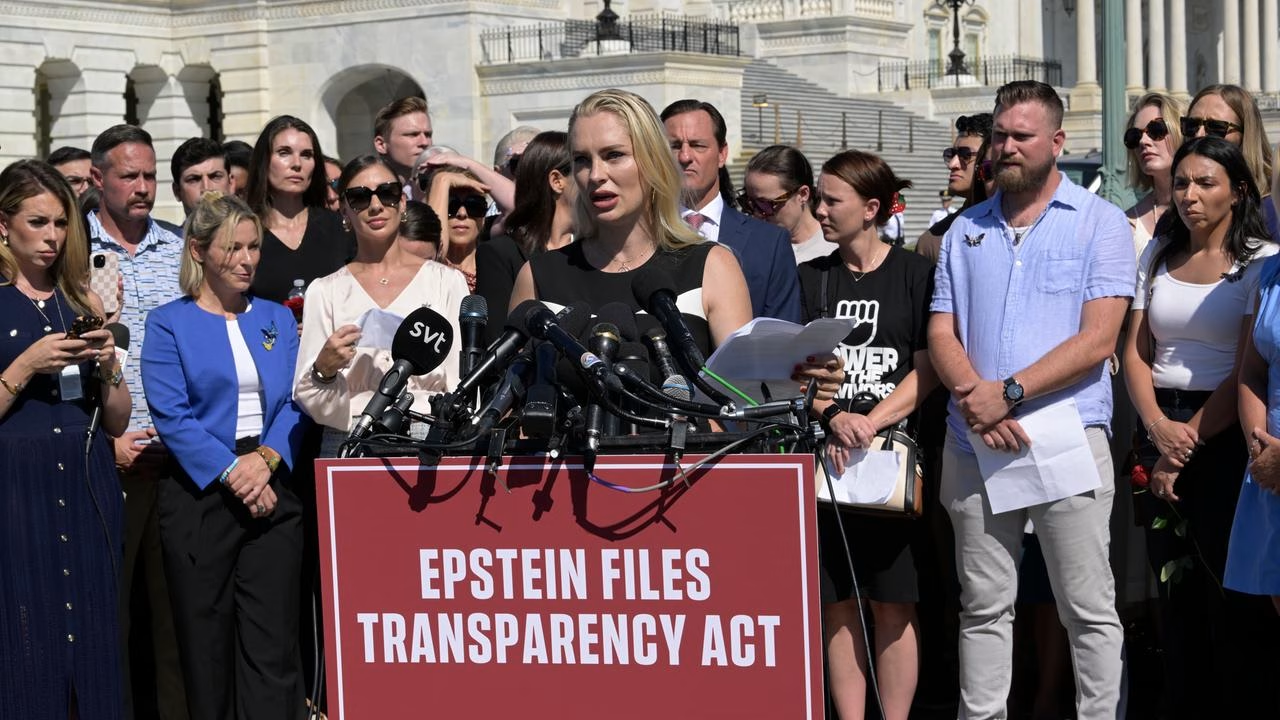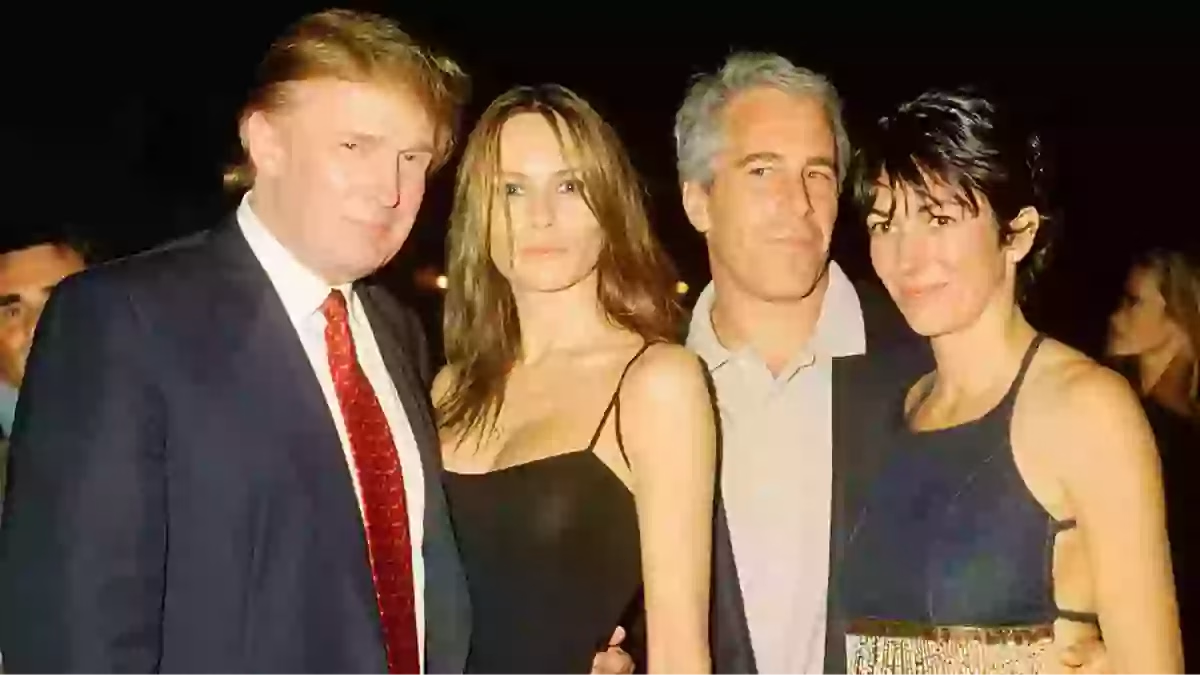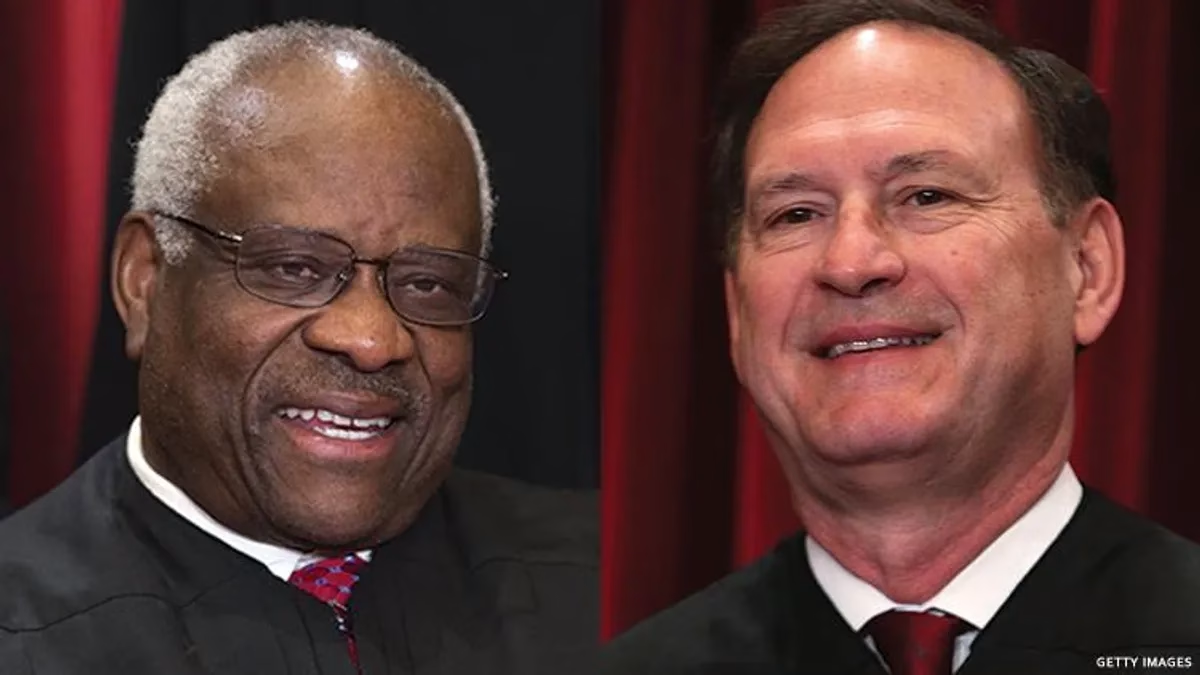By Mary Jones | Friday, September 05, 2025 | 7 min read
Donald Trump has always had a knack for sniffing out opportunity in other people’s pain. Bankruptcy, chaos, broken systems—he calls that “leverage.” Now, whispers are swirling around Jeffrey Epstein’s shadowy list, and it doesn’t take a political prophet to see how Trump might use it. Survivors of Epstein’s abuse are fighting for transparency to heal and hold the powerful accountable. Trump, meanwhile, looks at those same documents and sees something else entirely: a potential arsenal of blackmail, power, and cash.
This week, survivors stood before the nation. Their voices, long buried under silence and intimidation, cut through the political noise. Anoushka DiGiorgio, Annie Farmer, Marina Lacereda, Courtney Wilde, Jenalisa Jones, Hailey Robson, and Shanta Davies spoke not as pawns in a partisan fight but as human beings carrying scars. They told of being teenagers, children even, when Epstein and Ghislaine Maxwell lured them into a web of abuse. Farmer was sixteen, flown to New Mexico under the guise of a getaway. Wilde was just fourteen, introduced to Epstein by a friend barely older than herself. Jones remembered crying all the way home after being abused in Palm Beach, terrified no one would believe her over a billionaire surrounded by celebrities.
Each story was devastating in its own right, but together they formed a picture of a system meticulously designed to exploit the vulnerable. Maxwell wasn’t a sidekick; she was an architect. Davies recalled her manipulative, almost polite grooming—soothing tones that masked the trap. To hear survivors describe Maxwell laughing in a recent deposition with Trump’s lawyer Todd Blanche was like a gut punch. For them, it was déjà vu: the same friendly face hiding monstrous betrayal.
These women aren’t speaking for political gain. They’re begging Congress to pass the Epstein Transparency Act and make the files public. They want answers: who enabled Epstein, who protected him, who turned away while girls were destroyed. Their plea was simple: “See us, hear us, believe us.”
Trump’s response? To sneer and call their truth a “Democratic hoax.” Survivors who once voted for him, who placed fragile trust in his promise to fight for “forgotten Americans,” now feel betrayed. Jones put it bluntly: “I put my hope in him… and he’s supposed to protect us.” Her plea to Trump was painfully human: “You have daughters. Could you imagine if that was your daughter? You should be supporting us.” Instead, he dismissed them with the same contempt he shows toward anything that threatens his power.
And that contempt matters, because the Epstein files are not dusty history. They are live ammunition. If Bill Gates’ sudden defensiveness is any indication, the material inside those files is radioactive. Gates isn’t running for office, but he still felt compelled to quietly distance himself from a consulting firm long tied to Democratic politics. No press release, no fanfare—just a quiet severing of ties that raises questions.
Why now, just as Democrats intensify their push to unseal the Epstein files? Gates, who has already faced scrutiny for his ties to Epstein, didn’t issue denials or public attacks. Instead, his silence was paired with a subtle repositioning that looks less like coincidence and more like preparation. He doesn’t need to spell it out—his actions suggest he sees what’s coming.
For Democrats, that should be a warning. If one of the richest men alive is adjusting in the shadows, it suggests those files aren’t just embarrassing—they could be explosive. And if Gates is bracing, he won’t be the last.
Which brings us back to Trump. This is the man who has built his life on lawsuits, NDAs, and hush money. Blackmail isn’t foreign to him; it’s practically a business model. From Stormy Daniels to Michael Cohen, Trump’s playbook has always been about control through secrets. Epstein’s files, with their mix of rumor, receipts, and names with reputations to protect, are his dream toolkit. Each sealed document becomes a bargaining chip. Each famous name is a potential deal.
That’s the nightmare. Survivors are asking for sunlight because secrecy breeds complicity. But Trump thrives in shadows. If the list stays hidden, he doesn’t have to expose it—he just has to hint that he knows what’s inside. That’s how leverage works: dangle the threat, let fear do the rest.
Meanwhile, the survivors pay the price twice over. First, in childhood, when the system failed to protect them. Now, as adults, when their trauma risks being twisted into a political weapon. They are asking for transparency not because they want headlines, but because they want peace. “Why does the government hide this information from the public?” Davies asked. “This secrecy is not protection, it’s complicity.”
She’s right. Every day the files remain sealed, powerful men exhale with relief—and survivors live with reopened wounds. And in that silence, Trump grows louder, mocking their pain while inching closer to a new power source. He’s not trying to heal this wound; he’s trying to harvest it.
This is not some abstract worry. Trump has already signaled his intentions. By branding survivor testimony as a “hoax,” he’s testing the waters, softening the ground for when he inevitably positions himself as the gatekeeper of whatever Epstein secrets remain. Imagine him on the campaign trail, dangling hints of who’s on the list, feeding his base red meat while privately working the phones to cut deals with the very elites he claims to oppose.
If this sounds grotesque, that’s because it is. But it’s also the Trump way: to turn even human suffering into a commodity. He doesn’t want Epstein’s files opened because openness kills leverage. Survivors want light. Trump wants shadows.
Trump sees Epstein’s list as a menu. Survivors see it as the key to closure. The question now is whether the American people will side with justice—or allow Trump to weaponize the darkest chapter of human exploitation for his own gain.
Because make no mistake: if that list stays sealed, Trump won’t see broken children—he’ll see bargaining chips. And he’ll play them with the ruthlessness of a man who has never cared about anyone’s pain but his own.
The survivors who stood up this week aren’t asking for politics, or headlines, or vengeance. They’re asking for something much simpler: truth. “See us, hear us, believe us,” they said. If we leave these files buried in shadows, we’re not just protecting the powerful—we’re betraying the girls they once were.
And in that betrayal, Trump will thrive. He always has. The only way to stop him from turning their trauma into his leverage is to rip open the secrecy once and for all. Sunlight or shadows—that’s the choice. The survivors have already chosen. Now the rest of us have to decide whose side we’re on.
ahoo and Google are now ranking Mein Kampf & Trump: A Dangerous Resemblance among trending political books and articles. What’s fueling the attention? Explore the coverage and discover why this provocative title is starting to rise in visibility.
- Yahoo Ranking: https://bit.ly/4lmhSCz
- Google Ranking: https://bit.ly/44LFppG
More From FeDlan News:
The GOP Is Headed for a 2026 Brutal Midterm Loss — Even With Gerrymandering
Trump’s Cabinet Grovels in Marathon Meeting Like Courtiers Before a Crazy King
Fact Check: Explosive Rumor Claim Donald Trump Has Alzheimer’s Disease. Here’s What the Facts Says
Mass Resignations Cripple CDC as Trump Administration Clash Over Science and Public Health
Blanche’s Defense and Maxwell’s Testimony in Epstein Case Provide Little Clarity for Trump
Copyright 2025 FN, NewsRoom.






